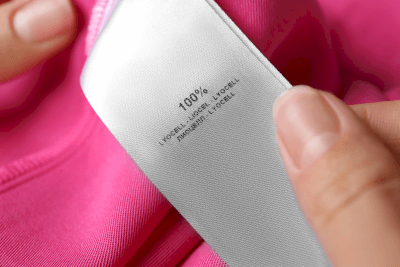What Is Lyocell?

Lyocell is a fiber made mainly from eucalyptus, a type of wood.
Unlike synthetic fibers made from petroleum, such as nylon and polyester, Lyocell is a type of fiber called a recycled fiber. It is known as an environmentally friendly fiber because it is made from natural raw materials and 99% of the solvents used to make the fiber can be recovered and recycled.
Despite being a natural raw material, the cross section of the fiber is circular, and the force applied to the fiber is even, making it strong and durable.
Uses of Lyocell
Lyocell is used for clothing such as shirts and dresses, stoles, and bedding covers because of its soft texture and luster, as well as its resistance to shrinkage even after washing.
Typical industrial applications include sheets, filters, and electrical insulation paper in combination with synthetic leather.
Properties of Lyocell
Lyocell’s chemical formula is cellulose (C6H10O5)n. In addition to lyocell, other cellulose-based fibers include cotton, rayon, and Cupro. Although they have the same chemical structure, the degree of polymerization of cellulose differs: cotton has a degree of polymerization of 2,000 to 3,000, rayon about 300, Cupro about 500, and Lyocell about 650.
A higher degree of polymerization creates a stronger mechanical strength and a higher heat resistance temperature. In addition, since the main component is cellulose, it has the property of biodegradability, which means that it is decomposed by microorganisms in nature. Compared to other recycled fibers such as rayon and Cupro, its mechanical strength is stronger and its strength when wet is the strongest among cellulose fibers.
Due to its high strength, it shrinks less after washing and has high dimensional stability. The cross section of the fiber is circular and has a unique texture, resilience, and elasticity. It also has a smooth, shiny surface with a good texture, and is sometimes compared to silk.
Characteristics of Lyocell
Lyocell is not only strong and durable but also has a soft texture and luster due to its soft fiber. Due to its similarity in structure to cotton, Lyocell is quick-drying and moisture-absorbent, and static electricity is not generated easily.
On the other hand, when it gets wet, its texture becomes hard, and friction during washing may cause it to shed.
Other Information on Lyocell
1. Classification
Lyocell is sometimes called TENCEL, but since TENCEL is a registered trademark of Lenzing of Australia, the fiber type is unified as Lyocell. The labeling name of the fiber is “recycled fiber (lyocell)”.
2. Manufacturing Method
Lyocell is manufactured by wet spinning, in which eucalyptus wood is dissolved in an organic solvent and spun into yarn. Eucalyptus wood is broken down into a pulp, dissolved in N-methylmorpholin-N-oxide (NMMO), and the liquid form is regenerated into fiber in an organic solvent.
Finally, the solvent used is rinsed off to produce Lyocell fiber. The solvent used to dissolve the pulp is recovered in the washing process and recycled for subsequent production of Lyocell fiber. This enables environmentally friendly fiber production with as little waste liquid as possible.
3. Washing Method
Hand washing or pressing is recommended, as Lyocell becomes hard when wet and fluffiness occurs when subjected to friction while wet. Since it easily bleaches, a laundry net and a mild detergent can be used to maintain quality.
The heat resistance temperature is around 75°C. When ironing, a medium temperature of 75°C or lower is recommended. Use of a dryer is not recommended due to higher temperatures and friction.
4. Future Demand
The fashion industry is promoting the use of natural raw materials as well as high performance and a shift to manufacturing methods with less environmental impact. Demand for Lyocell is expected to increase in the future because it is a naturally derived raw material and almost 100% of the organic solvents used in the manufacturing process can be reused.
Eucalyptus, which is used as a raw material, grows quickly and can be grown without the use of chemical fertilizers or pesticides, making it an environmentally friendly wood that is also attracting attention.